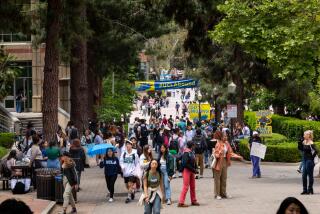Navy Life Can Make Waves for Families
- Share via
POINT MUGU — Navy pilot Michael J. Becknell controls the sky during the week, his squadron of high-tech E-2C Hawkeyes practicing for missions that will take them across the globe at the head of a multibillion-dollar aircraft carrier battle group.
But on the weekends, after the drills are over, Becknell wades into traffic on a three-hour journey to a more normal life--to the San Diego house where his wife, Gwen, and two daughters have a week’s worth of stories to tell.
Becknell said the short time with his family is intense and, invariably, inadequate.
“It makes you want to be more of a father and husband the time that you’re there,” he said. “You try to make up for it, but you’ve only got 48 hours to do it in.”
An 18-year Navy veteran now stationed at Point Mugu Naval Air Weapons Station, Becknell is among the ranks of “geographic bachelors,” married sailors who live far from their families even when they are not out to sea.
Analysts say economic pressures and changing demographics have turned increasing numbers of Navy families into weekday strangers.
And while Becknell and others say the situation is just part of Navy life--and is nothing compared to six- or seven-month overseas deployments--the geographic bachelor phenomenon can have wide-ranging effects.
For the Navy, it can mean morale and retention problems. For communities such as Ventura County, it can undercut promises that bases and an influx of new personnel will lead to a broad economic boost.
For instance, the 2,500 people expected to arrive with the E2-C squadrons transferring to Point Mugu--bolstering the economy and crowding local schools--could be far fewer if many service members leave their families behind.
Petty Officer Patrick Earls, a building supervisor at Point Mugu’s bachelor housing quarters and a geo bachelor himself, said sailors react differently to living far from their families during the work week.
“It all depends on how you look at it,” he said. “For some people it’s harder. For me, it’s easier.”
Earls said his family’s decision to live elsewhere was driven by economics and his wife’s desire to be independent.
His wife, Shonda, and two daughters live in Upland, where Earls said child care is cheaper, employment opportunities are better and rents are lower.
More Navy Wives Have Own Careers
Before the move to Upland, when the family lived in the county, Earls said he had to work long hours at a second job to make ends meet.
“That was beginning to be more of a strain on our relationship,” he said.
In fact, marriages play a large role in the changes that have made geographic bachelors a common sight.
Analysts at the Navy’s Bureau of Personnel say the increasing presence of married women in the workplace, coupled with a growing proportion of service members with families, has made it more difficult for sailors to take their families when they move from base to base.
According to officials, about 60% of Navy personnel have families, up from about 40% in 1980.
Military salaries, which some studies estimate are 13.5% less than nonmilitary pay for comparable work, can also be a factor, further driving the need for two-income families in the armed services.
Instead of picking up their family roots--including good schools, spouses with established careers and mortgage payments--many sailors now choose to leave them intact, and behind.
The Navy Office of Information at the Pentagon estimates that about 9,000 of its sailors are geo bachelors, but that number does not include the hundreds, or perhaps thousands, who do not live in government quarters.
Economics played a key role in Petty Officer Jeffrey Dickerson’s decision to leave his family in San Diego. Michelle, his wife of two years, got a good job offer months before the move to Ventura County, he said.
“The job was a pretty big issue, because she gets paid pretty well,” he explained.
Even though he is just a car ride away from his family, Dickerson continues a ritual that sustained him during his last six-month stint out to sea with his E-2C squadron: He writes letters to his daughter.
And, like many other geo bachelors, he makes nightly phone calls to his wife.
While he said Point Mugu has done its best to smooth his stay in Ventura County, which will last at least until December 1999, Dickerson said he could not imagine continuing the lifestyle for too much longer.
“I don’t like being away from my family for that long,” Dickerson said. “I miss things like my daughter’s schooling, and functions she has at her school like plays.”
Navy pilot Becknell’s wife, Gwen, said the situation has been tough on their two children, especially their youngest daughter, Taylor Ann, 2.
“She walks around the first day after he’s gone, saying ‘Dad, dad, dad, dad. Where is he?’ ” she said. “We just say daddy’s gone, and he’ll be back on the weekend.”
On weekends, she said, her husband more than makes up for his absence--cleaning house, doing laundry, buying groceries and running errands that she could not handle between her full-time job and caring for their children.
“He’s like Mr. Mom,” she said. “He can’t do anything about it when he’s not here, but on the weekend he really does go over and above.”
But Gwen said the next year could be especially difficult because she is pregnant.
“What if I go into labor in the middle of the night?” she asked. “What am I going to do with these two kids?”
The rough road ahead is not lost on her husband.
“Knowing she’s got to take care of the kids and get to work and pick them up and be there for them when she comes back home from work, it’s tough to deal with that,” Becknell said.
Weekend Dads, Husbands
Tibortito Tan, a 25-year Navy veteran, is no stranger to sacrifices.
A senior chief cook at Port Hueneme, Tan has been a geographic bachelor since 1996, driving about six hours every Friday to spend two days with his family in Suisun City, a small town north of San Francisco.
Tan said he works long hours Monday through Thursday so that he can leave early Friday with a group of other geo bachelors. They return early Monday morning, giving Tan about three hours sleep before work.
His children’s ties to the area and a house that has not recovered its pre-recession value are two things that keep Tan’s family in Suisun City.
The children’s concerns are especially important, he said.
“They like the area, they grew up in the area, so they don’t want to leave that place,” Tan said. “You have to take that into consideration.”
The short time that he has with his family is “just like a regular day, like nothing’s going on,” Tan said.
“You try to spend as much time with them,” he said. “Especially on Sunday, you have that feeling that you don’t want to go but you have to go.”
Being away from family most of the week has also led Petty Officer Dickerson to appreciate family more.
“When you’re with your family everyday, you sort of take things for granted,” Dickerson said. “We tend to do more things than we did when I was in San Diego.”
E-2C pilot Becknell said that his family now does more things together on weekends, too.
But Becknell, who will be eligible for retirement in two years, said the situation has been a drain and may influence whether he stays in the Navy.
The current arrangement, he said, “is not what I envision my marriage to be.”
More to Read
Sign up for Essential California
The most important California stories and recommendations in your inbox every morning.
You may occasionally receive promotional content from the Los Angeles Times.










